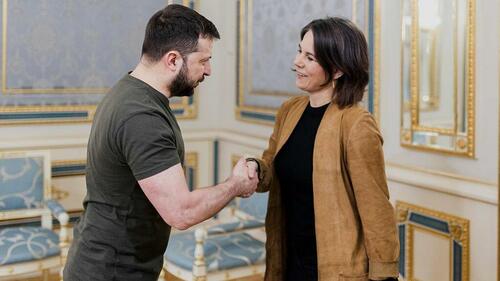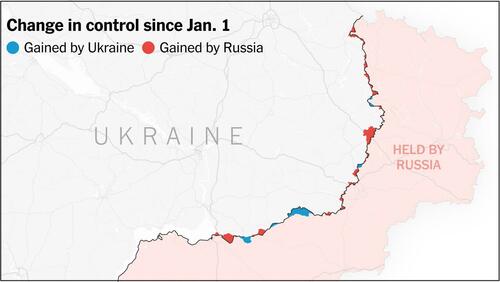
On Monday German Foreign Minister Annalena Baerbock issued an ultra-provocative statement which Moscow is sure to take as "fighting words". What's more is that the statement came while she was in Ukraine's capital for an unprecedented meeting of EU foreign ministers, who have newly committed themselves to supporting Kiev for as long as it takes, even as Washington appears to be stepping back. She said that the EU bloc will soon encompass lands "from Lisbon to Luhansk."
"Ukraine's future lies in the European Union, our community of freedom, and it will soon stretch from Lisbon to Luhansk," she said during a press conference. "It [Ukraine] also broadens its path to the EU with every village, every meter that it liberates, and every meter where it saves its people."

Ukraine had applied for EU membership on February 28, 2022 - and for months had urged to be fast tracked, however, a series of high level firings within the Zelensky administration over a series of corruption scandals has underscored once again Ukraine's historic place as among Europe's most corrupt governments. European officials have in the recent past said Ukraine's membership would take years if not decades.
Baerbock's mention of the EU one day stretching across Luhansk was directly aimed at Moscow, given that a year ago it declared the oblast as among the four territories united to the Russian Federation after a popular referendum organized and overseen by pro-Kremlin officials.
At this point in the war, there's consensus among war observers that neither side would agree to a ceasefire or peace negotiations short of territorial concessions. But President Zelensky has repeatedly vowed to never give up Donetsk, Luhansk, Kherson and Zaporizhia regions. At the same time Russian President Putin has previously called the inhabitants of these annexed territories "our citizens forever".
The Kremlin's Foreign Ministry spokeswoman, Maria Zakharova, as well as Russian media, responded with the following push-back:
Lisbon is the capital of Portugal, which along with Ireland and part of Spain makes up the EU’s western edge. Lugansk is the main city of the People’s Republic of Lugansk, which officially became part of the Russian state last year, together with the People’s Republic of Donetsk and the Kherson and Zaporozhye regions. The move followed referendums that saw the populace in the four regions overwhelmingly support reunification with Moscow. Ukraine and its Western backers refused to recognize the results of the votes.
"It’s either us joining the EU or she forgot about the requirement to turn by 360 degrees," Zakharova wrote on Telegram in response to Baerbock’s statement.
And a separate RT headline had characterized Baerbock's words as follows: Germany promises to extend EU into Russia. Clearly, neither the EU nor NATO is encouraging Kiev to engage in peace negotiations at this point, despite the Ukrainian offensive having failed.

Meanwhile, Germany's military exports to Ukraine have surged fourfold this year, as CNBC tallies that "Ukraine accounted for 3.3 billion euros ($3.48 billion) out of Germany’s total value of authorised military exports of 8.76 billion euros in the first nine months of the year." And by comparison, "for the same period last year, 775 million euros’ worth of equipment had been approved for Ukraine," the report notes.
On Monday German Foreign Minister Annalena Baerbock issued an ultra-provocative statement which Moscow is sure to take as “fighting words”. What’s more is that the statement came while she was in Ukraine’s capital for an unprecedented meeting of EU foreign ministers, who have newly committed themselves to supporting Kiev for as long as it takes, even as Washington appears to be stepping back. She said that the EU bloc will soon encompass lands “from Lisbon to Luhansk.”
“Ukraine’s future lies in the European Union, our community of freedom, and it will soon stretch from Lisbon to Luhansk,” she said during a press conference. “It [Ukraine] also broadens its path to the EU with every village, every meter that it liberates, and every meter where it saves its people.”

Ukraine had applied for EU membership on February 28, 2022 – and for months had urged to be fast tracked, however, a series of high level firings within the Zelensky administration over a series of corruption scandals has underscored once again Ukraine’s historic place as among Europe’s most corrupt governments. European officials have in the recent past said Ukraine’s membership would take years if not decades.
Baerbock’s mention of the EU one day stretching across Luhansk was directly aimed at Moscow, given that a year ago it declared the oblast as among the four territories united to the Russian Federation after a popular referendum organized and overseen by pro-Kremlin officials.
At this point in the war, there’s consensus among war observers that neither side would agree to a ceasefire or peace negotiations short of territorial concessions. But President Zelensky has repeatedly vowed to never give up Donetsk, Luhansk, Kherson and Zaporizhia regions. At the same time Russian President Putin has previously called the inhabitants of these annexed territories “our citizens forever”.
The Kremlin’s Foreign Ministry spokeswoman, Maria Zakharova, as well as Russian media, responded with the following push-back:
Lisbon is the capital of Portugal, which along with Ireland and part of Spain makes up the EU’s western edge. Lugansk is the main city of the People’s Republic of Lugansk, which officially became part of the Russian state last year, together with the People’s Republic of Donetsk and the Kherson and Zaporozhye regions. The move followed referendums that saw the populace in the four regions overwhelmingly support reunification with Moscow. Ukraine and its Western backers refused to recognize the results of the votes.
“It’s either us joining the EU or she forgot about the requirement to turn by 360 degrees,” Zakharova wrote on Telegram in response to Baerbock’s statement.
And a separate RT headline had characterized Baerbock’s words as follows: Germany promises to extend EU into Russia. Clearly, neither the EU nor NATO is encouraging Kiev to engage in peace negotiations at this point, despite the Ukrainian offensive having failed.

Meanwhile, Germany’s military exports to Ukraine have surged fourfold this year, as CNBC tallies that “Ukraine accounted for 3.3 billion euros ($3.48 billion) out of Germany’s total value of authorised military exports of 8.76 billion euros in the first nine months of the year.” And by comparison, “for the same period last year, 775 million euros’ worth of equipment had been approved for Ukraine,” the report notes.
Loading…





